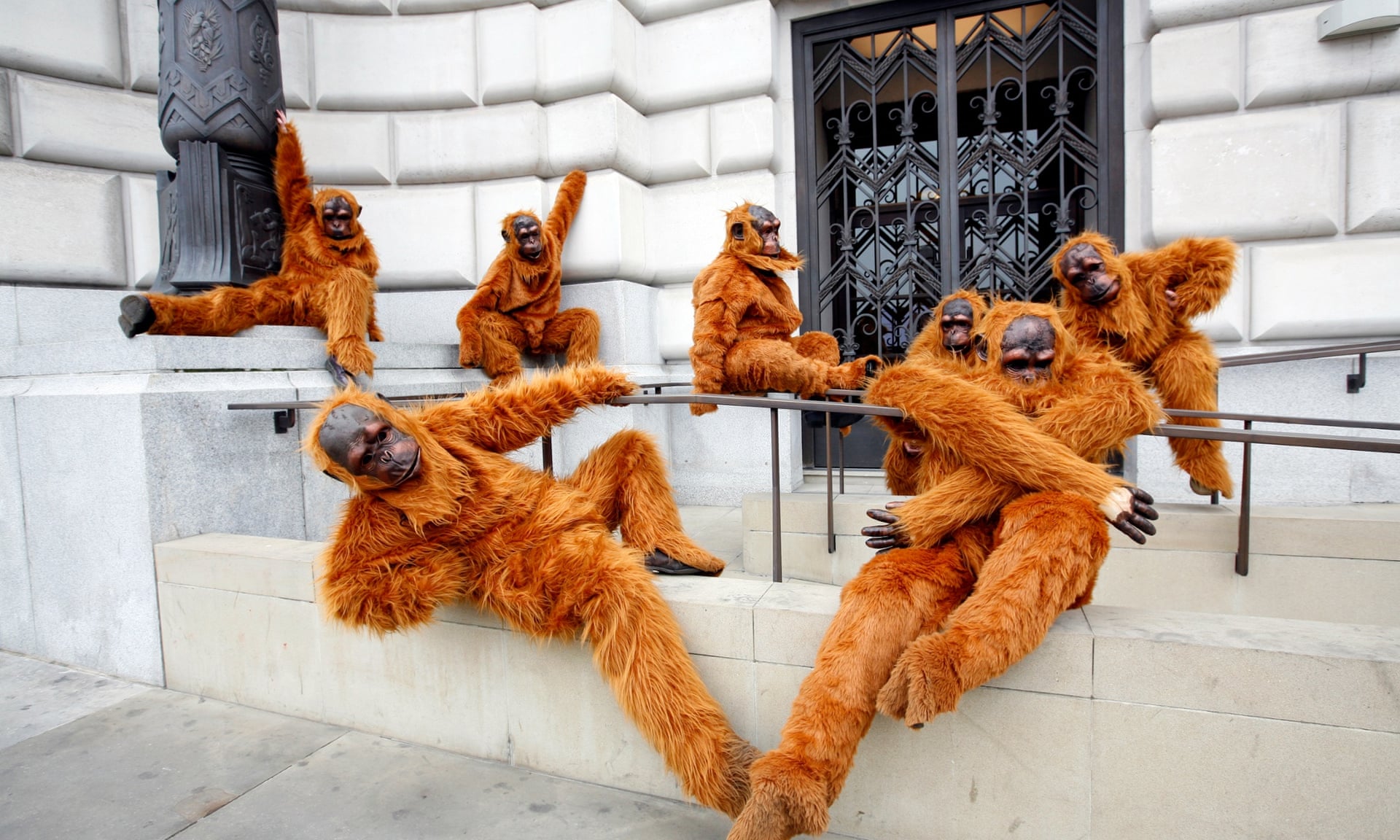
Greenpeace campaigners dressed in orangutan costumes protest outside the offices of Unilever in London, calling for a moratorium on the expansion of oil palm plantations. Photograph: Martin Argles
Does campaigning work? I’m often asked this question. In 2010, when I was director of the World Development Movement, I was interviewed by the Ecologist magazine and was optimistic about the rise of activism and the opportunities to build solidarity under a Tory government. But I’m increasingly convinced that either we’ve been using the wrong methods in our campaigns, or we’re missing something altogether.
The evidence? Environmental groups fighting U-turns on hard fought policies, like renewable energy; garment factory workers still facing working conditions that were highlighted two decades earlier; strong anti-World Trade Organisation campaigns, but yet another unjust free-trade policy, the Transatlantic Trade Partnership, looming on the horizon. We win a few campaigns, some of which I’m proud to have been involved with, but the overall direction of travel remains the same.
There are three key reasons why campaigning is failing:
1. “The Thin Yes”
Many of the so-called wins in recent years have failed because they haven’t been coupled with a long-term shift in values. In the mid-90s, Shell’s sinking of the Brent Spar was seen as a transformative event in the life of the company, a shift away from doing harm, to being a responsible corporate citizen. Today, Shell is drilling for oil in the arctic. The company didn’t embed values to move away from fossil fuels, and so reverted to type. Rosie Walford, a sustainability leadership coach, refers to this as a “thin yes”. It’s a yes without meaning, without belief.
Micha White, one of the founders of the Occupy Movement, has also expressed his doubts. In a recent interview, he said: “Occupy was a perfect example of a social movement that should have worked according to the dominant theories of protest and activism. And yet, it failed.” Instead, he thinks we need to address the issue of belief. “What I am proposing is a type of activism that focuses on creating a mental shift in people. Basically an epiphany.”
2. Campaigning can’t tackle a system
I know from experience that successful campaigns need a perfectly clear ask, ie change x law. But often what we need are large-scale systemic changes, not a simple change in the law. When I campaigned to end speculation in food commodities, I knew full well that the legal changes we sought weren’t going to solve the problems in our global food system; speculators were just one piece of a very complex puzzle.
But complexity doesn’t lend itself to campaigns, though some have tried. During the Copenhagen climate talks, activists used the slogan: “systems change, not climate change”. But system change comes from the bottom up, it requires a whole system to engage – not just campaigners on their own – and it takes a lot of time. It doesn’t inspire people to get involved, nor does it help those who need to change understand the problem.
Campaigners aren’t necessarily to blame for this. Companies must understand what campaigners are asking for; governments won’t listen unless there’s at least many thousands of people who have signed something; and even funders are guilty of seeking short-term focused wins over providing core funding to organisations working for the longer-term.
3. Combat v collaboration
As campaigners, we often know the buttons to press to get short-term wins. Usually this involves anger, using words such as “stop” this or “save” that. We put up pictures of an “evil” politician or “evil” corporate bosses and expect to inspire change. Even I, a seasoned campaigner, turn off. Of course, when there’s a clear corporate wrong, like Unilever’s mercury poisoning in south India, an angry aggressive campaign makes sense.
But imagine, for a moment, what it feels like when someone argues with you. Your tendency is to be defensive, or to think “piss off”. It’s not often that someone wants to engage in a progressive change agenda while staring down the barrel of a gun.
Campaigners need to find ways to engage, either directly or indirectly, while maintaining their values. This isn’t to be confused with the empty stakeholder dialogues of recent years. But long-term change won’t happen solely through protest and with only half the audience in the room. This applies to both sides. Can business, for example, let activists in the room without manipulating them? Are they prepared to listen?
I don’t think campaigns should cease. They open doors, they can get people thinking. But unless campaigning is coupled with approaches that are deeper, then we’ll be keep fighting the same old battles until we’re piling up sandbags to hold back the floods, and then it will be too late to do anything about it.